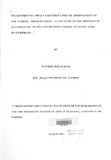| dc.contributor.author | Gichuki, David K | |
| dc.date.accessioned | 2014-04-01T11:00:54Z | |
| dc.date.available | 2014-04-01T11:00:54Z | |
| dc.date.issued | 2001-08 | |
| dc.identifier.citation | DEGREE OF MASTER OF ARTS IN PLANNING | en_US |
| dc.identifier.uri | http://hdl.handle.net/11295/65697 | |
| dc.description | A Thesis Submitted In Partial Fulfillment Of The Requirements
For The Degree Of Master Of Arts In Planning, University Of
Nairobi. | en_US |
| dc.description.abstract | This study set out to examine the most likely impacts of the construction of a proposed
road re-alignment. The construction of the proposed re-alignment of a section of the
Nairobi - Mombasa Road starting from Thange River Bridge to just a few kilometers
before reaching Mtito Andei River. The study established that several townships among
them Machinery, Kambu and Hillside will be by-passed by the construction of the
proposed alignment.
From the field study and more so from the history of Machinery and Kambu it emerged
very clearly that the economic base of the townships along the existing road depends
highly on the traveler customer. It was found out that 87.9% of the drivers would not enter
the by-passed townships for services after the construction of the by-pass which is likely to
lead to decline of these township.
The by-pass is proposed to pass through a settled rural area and it was established that
several private properties including houses, churches and even graves will be destroyed.
The government intends to invoke the Compulsory Land Acquisition Act Cap 295 of the
laws of Kenya to acquire the affected private land.
The valuation and hence the compensation procedures have left out some important aspects
of the affected people's culture. The Compulsory Land Acquisition Act does not
compensate for a grave and so the graves were not valued. At least 80% of the respondents
felt that the graves should not be interfered with but instead the road should be re-aligned
further to avoid graves. At least 150 Ha.of agricultural land will be taken by transportation
after the implementation of the proposal which is sure to reduce agricultural production by
about Kshs. 2 Million per year. Fragmentation of the agricultural land parcels will even
reduce agricultural production even further.
The construction of the proposed re-alignment will interfere with the ecosystem by
clearing the bushes to pave way for the proposed road and at the same time in the
destruction of vegetations if spoil material is not handled in an environmentally friendly
manner. The local streams are likely to be polluted as a result of soil erosion during and
after the construction process.
To come up with a sustainable road improvement project it is imperative that mitigation
measures be put in place to stop or reduce negative socio-economic and ecological impacts
arising from the proposed re-alignment. In a situation where mitigation is not adequate,
then compensation measures should be put in place. Among the aims of the study is to
ensure that the people affected maintain the same standard of living or even better and at
the same time not compromising the chances of the future generation to use of the
resources in the area. | en_US |
| dc.language.iso | en | en_US |
| dc.publisher | University Of Nairobi | en_US |
| dc.title | Environmental impact assessment for the improvement of the Nairobi - Mombasa Road. A Case study of the proposed realignment of the section between Thange to Mtito- Andei river bridges | en_US |
| dc.type | Thesis | en_US |

